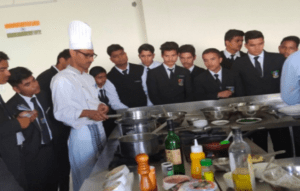Food and Beverage – I- It seems like you’re interested in the field of Food and Beverage Management in the context of a BHMCT (Bachelor of Hotel Management and Catering Technology) program. Food and Beverage Management is a crucial aspect of the hospitality industry, focusing on the planning, organization, and supervision of various food and beverage operations within hotels, restaurants, resorts, and other hospitality establishments.
In a BHMCT program with a specialization in Food and Beverage Management, you can expect to learn about a wide range of topics related to this field. Here are some key areas you might study:
- Culinary Arts: Understanding different cooking techniques, food preparation, and presentation. This could involve both theory and practical hands-on experience in the kitchen.
- Beverage Management: Learning about various types of beverages, including alcoholic and non-alcoholic, and their service, storage, and handling. This could also cover mixology and wine appreciation.
- Food and Beverage Service: Covering the intricacies of serving guests in a professional and hospitable manner. This might include table setup, order taking, etiquette, and handling guest inquiries.
- Menu Planning and Design: Developing skills to create balanced and appealing menus that cater to different preferences, dietary restrictions, and cultural considerations.
- Food Safety and Hygiene: Understanding the importance of maintaining high standards of food safety and hygiene to ensure the health and well-being of guests.
- Cost Control: Learning about managing costs related to food and beverage operations, including inventory management, portion control, and budgeting.
- Customer Service: Developing excellent customer service skills to enhance guest satisfaction and loyalty.
- Hospitality Laws and Regulations: Familiarizing yourself with the legal and regulatory aspects related to food and beverage operations, such as health and safety regulations and licensing requirements.
- Event Management: Gaining insights into organizing and managing food and beverage services for various events, conferences, weddings, and more.
- Communication and Interpersonal Skills: Enhancing your ability to communicate effectively with guests, colleagues, and other professionals within the industry.
Throughout your BHMCT program, you might have opportunities for practical training, internships, and projects that allow you to apply your theoretical knowledge in real-world hospitality settings. These experiences are valuable for building your skills and understanding the dynamics of the industry.
Keep in mind that specific course offerings and curriculum details can vary between institutions offering BHMCT programs, so it’s a good idea to explore the program syllabus of the university you’re interested in to get a comprehensive understanding of the subjects and topics you’ll be studying.
What is Food and Beverage – I
It appears that “BHMCT Food and Beverage – I” might refer to a specific course or module within a Bachelor of Hotel Management and Catering Technology (BHMCT) program that focuses on the Food and Beverage Management aspect. The “Food and Beverage – I” designation suggests that it’s likely the first part of a series of courses dedicated to this subject.
In such a course, you can expect to cover foundational concepts related to food and beverage management within the context of the hospitality industry. The course might include topics like:
- Introduction to Food and Beverage Management: An overview of the role of food and beverage operations within the hospitality industry, including its importance, scope, and various functions.
- Culinary Basics: Fundamental understanding of cooking techniques, ingredients, and principles of food preparation.
- Beverage Fundamentals: Introduction to different types of beverages, including non-alcoholic and basic alcoholic drinks, along with their service and presentation.
- Food Safety and Hygiene: Learning about maintaining high standards of food safety, proper handling of ingredients, and ensuring a clean and sanitary kitchen environment.
- Menu Planning: Basics of creating well-balanced and appealing menus, considering factors like customer preferences, seasonal ingredients, and dietary requirements.
- Food and Beverage Service: Introduction to the art of table setting, guest interaction, and providing exceptional service.
- Introduction to Hospitality Laws and Regulations: Basic understanding of legal and regulatory requirements related to food and beverage operations.
- Customer Service Skills: Developing interpersonal and communication skills crucial for providing excellent customer service.
- Basic Cost Control: Introduction to concepts of managing costs, portion control, and inventory management in food and beverage operations.
- Introduction to Event Management: An overview of how food and beverage services are planned and executed for various events.
Remember that the specific content covered in the “BHMCT Food and Beverage – I” course may vary depending on the institution offering the program. This course is likely designed to provide a solid foundation upon which more advanced and specialized concepts will be built in subsequent courses within the Food and Beverage Management curriculum. If you’re enrolled in or considering this course, be sure to refer to your program’s syllabus or course outline for precise details about the topics covered.
How is Food and Beverage – I

“BHMCT Food and Beverage – I” is likely a specific course or module within a Bachelor of Hotel Management and Catering Technology (BHMCT) program that focuses on introducing students to the basics of Food and Beverage Management within the context of the hospitality industry. The course is designed to provide students with foundational knowledge and skills related to food and beverage operations, culinary arts, customer service, and more.
The specific content and structure of the course can vary depending on the educational institution offering the BHMCT program. However, here’s a general overview of what you might expect in a “BHMCT Food and Beverage – I” course:
- Introduction to Food and Beverage Management: An overview of the role of food and beverage operations in the hospitality industry, including its significance, scope, and functions.
- Culinary Fundamentals: Basic understanding of cooking techniques, ingredients, and food preparation methods.
- Beverage Essentials: Introduction to various types of beverages, both alcoholic and non-alcoholic, along with their service and presentation.
- Food Safety and Hygiene: Learning about maintaining high standards of food safety, proper handling of ingredients, and ensuring a clean and sanitary kitchen environment.
- Menu Basics: Introduction to menu planning, including factors like menu layout, dish selection, and pricing.
- Food and Beverage Service Skills: Basic training in table setting, guest interaction, and providing quality service.
- Customer Service Skills: Developing interpersonal and communication skills necessary for delivering excellent customer experiences.
- Introduction to Hospitality Laws and Regulations: Basic understanding of legal and regulatory aspects related to food and beverage operations.
- Cost Control Basics: Introduction to managing costs, portion control, and inventory management in food and beverage establishments.
- Introduction to Event Management: Overview of how food and beverage services are organized for different types of events.
Throughout the course, you can expect a combination of theoretical lessons, practical hands-on experiences, demonstrations, and possibly even guest lectures from industry professionals. The goal of “BHMCT Food and Beverage – I” is to provide you with a strong foundation that you can build upon in more advanced courses and throughout your hospitality management career.
If you’re currently enrolled in or considering taking this course, it’s recommended to review your program’s syllabus or course outline to get a more detailed understanding of the topics covered and the learning outcomes expected.
Application of Food and Beverage – I
The application of the knowledge and skills gained from the “BHMCT Food and Beverage – I” course in a Bachelor of Hotel Management and Catering Technology (BHMCT) program is essential for preparing students to work effectively within the food and beverage management sector of the hospitality industry. Here’s how you might apply what you’ve learned from this course:
- Culinary Skills: You’ll be able to apply your understanding of basic cooking techniques and food preparation methods in a real kitchen setting. This includes preparing dishes, handling ingredients safely, and ensuring food quality and taste.
- Beverage Service: You can apply your knowledge of different types of beverages and their presentation to serve customers in a professional and knowledgeable manner. This could include mixing and serving drinks, suggesting pairings, and explaining beverage options to guests.
- Food Safety and Hygiene: The principles you’ve learned about food safety and hygiene will be crucial when handling food and maintaining a clean and safe kitchen environment. This ensures the well-being of both guests and staff.
- Menu Planning and Design: When assisting in menu planning, you’ll be able to create balanced and appealing menus that cater to different tastes and dietary requirements. This can enhance guest satisfaction and contribute to the establishment’s success.
- Food and Beverage Service: Your training in service skills will help you interact professionally with guests, take orders, serve meals, and address customer inquiries. Delivering excellent service is essential for positive guest experiences.
- Customer Service: The interpersonal and communication skills you’ve developed will be valuable in providing exceptional customer service. You can engage with guests effectively, address concerns, and ensure their needs are met.
- Hospitality Laws and Regulations: Knowledge of legal and regulatory requirements will guide your actions in maintaining compliance with health and safety standards, alcohol service laws, and other regulations.
- Cost Control: Applying cost control principles can help you manage resources efficiently, minimize waste, and contribute to the financial success of food and beverage operations.
- Event Support: If you’re involved in event management, you’ll be able to apply your understanding of food and beverage services to ensure that events are organized smoothly, with attention to detail and guest satisfaction.
- Collaboration: Throughout your career, you’ll collaborate with chefs, waitstaff, and management. Applying teamwork skills and effective communication will lead to a harmonious and successful working environment.
Ultimately, the application of the knowledge and skills gained from the “BHMCT Food and Beverage – I” course will enable you to contribute effectively to various aspects of food and beverage operations in the hospitality industry. As you progress through your studies and gain more experience, you’ll continue to build upon this foundation to excel in your career within the field of food and beverage management.
Case Study on Food and Beverage – I
Fresh Bites Café
Fresh Bites Café is a newly opened casual dining establishment located in a bustling urban area. The café focuses on providing fresh, healthy, and locally sourced meals to its customers. The café owners, Sam and Emily, have recently completed their BHMCT program, including the “Food and Beverage – I” course. They are excited to put their learning into practice.
Application of Course Knowledge:
- Culinary Skills: Sam and Emily use their understanding of basic cooking techniques to prepare dishes using fresh ingredients. They ensure that the dishes are cooked to perfection, maintaining flavors and presentation.
- Beverage Service: With their knowledge of different beverage types, Sam and Emily craft a menu that includes fresh fruit juices, herbal teas, and specialty coffees. They provide information to customers about each beverage’s ingredients and health benefits.
- Food Safety and Hygiene: Sam and Emily follow strict food safety guidelines while handling and preparing ingredients. They implement proper handwashing, use of gloves, and cleanliness practices to ensure customer safety.
- Menu Planning and Design: Drawing from their menu planning skills, Sam and Emily design a balanced menu that caters to diverse customer preferences. They create a mix of vegetarian, vegan, and non-vegetarian options, ensuring everyone finds something they enjoy.
- Food and Beverage Service: Applying their service skills, Sam and Emily interact warmly with customers, take orders accurately, and provide recommendations based on customer preferences. They ensure timely service and address any special requests.
- Customer Service: Sam and Emily use their interpersonal skills to engage with customers, listen to their feedback, and address any concerns. This creates a positive dining experience and encourages customer loyalty.
- Hospitality Laws and Regulations: Sam and Emily ensure the café operates in compliance with local health and safety regulations. They also adhere to food labeling requirements for allergens and nutritional information.
- Cost Control: Applying cost control principles, Sam and Emily manage portion sizes, minimizing food waste. They also track inventory to prevent overstocking and reduce operational costs.
- Event Support: When the café hosts a local farmers’ market event, Sam and Emily apply their event management knowledge to organize food stalls, coordinate seating arrangements, and ensure smooth operations.
Results:
Fresh Bites Café becomes a popular spot in the area due to its fresh and healthy offerings, attentive customer service, and adherence to safety standards. Sam and Emily’s application of knowledge from the “BHMCT Food and Beverage – I” course contributes to the café’s success. The café receives positive reviews for its food quality, service, and overall atmosphere.
Conclusion:
This case study illustrates how Sam and Emily, armed with knowledge gained from the “BHMCT Food and Beverage – I” course, successfully apply their skills to operate a café that prioritizes food quality, safety, customer satisfaction, and efficient cost management. Their education equips them to make informed decisions that contribute to the café’s reputation and growth.
Please note that this case study is entirely fictional and is designed to demonstrate the application of course knowledge. In real-world situations, success depends on a variety of factors including market conditions, competition, and the skills of the individuals involved.
White paper on Food and Beverage – I
Title: Enhancing Hospitality Excellence Through “BHMCT Food and Beverage – I”
Abstract: The hospitality industry is a dynamic and rapidly evolving sector that demands skilled professionals capable of delivering exceptional experiences to guests. The “BHMCT Food and Beverage – I” course plays a pivotal role in preparing students to excel in food and beverage management, an integral component of the hospitality domain. This white paper delves into the course’s curriculum, its practical relevance, and the ways in which students can apply the knowledge gained to real-world scenarios.
1. Introduction: The “BHMCT Food and Beverage – I” course is a foundational module within the Bachelor of Hotel Management and Catering Technology (BHMCT) program. It equips students with fundamental skills and knowledge required for successful food and beverage management within the hospitality industry.
2. Curriculum Overview: The course covers a range of topics, including culinary basics, beverage management, food safety, menu planning, customer service, and legal regulations. It provides a well-rounded understanding of various aspects essential for effective food and beverage operations.
3. Significance of the Course: Food and beverage services are at the heart of the hospitality industry. This course introduces students to the principles that govern culinary arts, food safety, and customer service. These skills are vital for providing high-quality dining experiences that meet guest expectations.
4. Application of Knowledge: 4.1 Culinary Skills: Graduates can utilize their cooking techniques to prepare diverse dishes that cater to different tastes and dietary requirements.
4.2 Beverage Management: The course imparts knowledge about beverages, allowing graduates to suggest pairings and craft unique drinks.
4.3 Food Safety and Hygiene: Graduates implement food safety protocols to ensure safe handling, storage, and preparation of food.
4.4 Menu Planning: Graduates design balanced menus that appeal to a diverse clientele and account for nutritional considerations.
4.5 Food and Beverage Service: The course hones interpersonal skills for providing attentive service, enhancing customer satisfaction.
4.6 Legal and Regulatory Compliance: Graduates adhere to hospitality laws and regulations, ensuring the establishment’s legal operations.
4.7 Cost Control: Graduates manage costs efficiently, contributing to profitability by minimizing waste and optimizing resources.
5. Industry Relevance: The hospitality industry seeks professionals who can navigate the complexities of food and beverage operations. Graduates of the “BHMCT Food and Beverage – I” course are well-prepared to contribute positively to hotels, restaurants, resorts, and event management settings.
6. Conclusion: The “BHMCT Food and Beverage – I” course serves as a cornerstone in building the skill set necessary for success in food and beverage management. Its practical orientation equips students to excel in culinary arts, customer service, and operational efficiency. As graduates enter the industry, their knowledge and expertise contribute to elevating guest experiences and ensuring the continued growth of the hospitality sector.
Please note that this white paper is a fictional creation and is intended to showcase the potential content and structure of a white paper discussing the significance and application of the “BHMCT Food and Beverage – I” course. If you are looking to create an actual white paper, you may want to gather real-world data, insights, and examples to make it comprehensive and informative.






